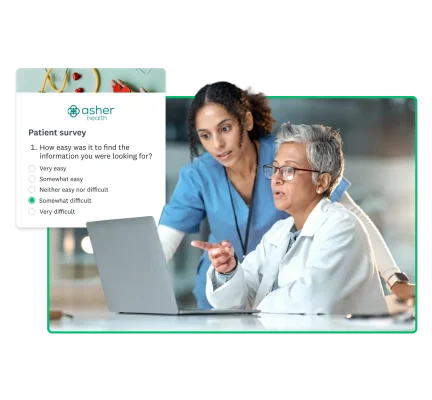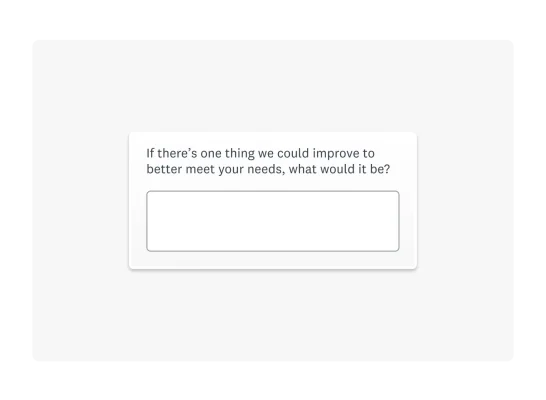Everything you need to know about healthcare surveys
Learn how to use healthcare surveys to streamline healthcare experience data collection and improve patient care.

- Healthcare surveys are crucial for gathering insights to improve patient care, service quality, and public health outcomes.
- Surveys include patient satisfaction surveys and provider feedback surveys, each focusing on different aspects of healthcare.
- The best practices for conducting a healthcare survey include clear objectives, a well-designed questionnaire, representative sampling, confidentiality assurance, and thorough data analysis.
Collecting and acting on feedback is the key to improving your services in any industry. In the healthcare sector, surveys are a fantastic tool for rapidly gathering feedback that can be turned into action-based improvements across your organization.
Enhancing your patient experience begins with collecting feedback as efficiently as possible. Here’s everything you need to know about using surveys to improve your healthcare organization, from the patient to the employee experience.
Why healthcare surveys are important
The COVID-19 pandemic fundamentally shifted both the healthcare worker and patient experience. According to SurveyMonkey research, 84% of healthcare professionals believe understanding the patient experience is more important than before the pandemic.

Healthcare surveys allow your business to collect feedback directly from your patients. By pinpointing touchpoints across the patient experience and listening to their reflections on them, you can better understand the experience you offer your patients.
Taking actionable steps based on the feedback you receive will allow you to iterate on the patient experience. Small improvements can compound over time, helping your business deliver a world-class customer experience. Considering that 54% of patients state that a word-of-mouth referral can significantly impact how they view an organization, building up customer loyalty with consistently great service is a win-win for your business.
Listening to the patient is now more common than ever, with 28% of healthcare executives stating that they ask patients for feedback more often. As a vital resource for improving your organization, soliciting feedback is too important to overlook.
How to use surveys to improve healthcare
Different healthcare providers use surveys in distinct ways, typically leveraging them to improve their business. For example, some savvy healthcare workers use surveys to boost their bottom line and navigate unexpected circumstances. On the other hand, some healthcare organizations, like Community Intervention Services Inc., will use healthcare surveys to collect critical insights related to Net Promoter Score® and other customer experience metrics.
However, healthcare surveys aren’t only for patients. Businesses can also leverage healthcare surveys to request feedback from people across their organization, from admin and medical practitioners to other providers. Understanding your employee experience will help you identify ways to improve it, leading to your employees giving better customer service.
Here are some of the ways you can transform your healthcare organization with surveys:
- Comply with federal accreditation requirements: Use surveys to streamline the process of meeting federal accreditation requirements and documentation.
- Track and manage your patient safety culture: Determine where your business could improve patient safety culture by surveying your staff on AHRQ patient safety culture examples.
- Measure healthcare employee engagement: Your employees are the driving force behind better patient experiences. By monitoring healthcare employee engagement and aiming to improve it, you’ll enhance customer experiences.
- Centralize hospital survey data in one place: Surveys offer a useful way of centralizing many forms of data collection, helping to better manage all your data in one place.
- Streamline patient intake: Your business can leverage online registration forms and medical history forms to rapidly check in new patients and ensure all your documents are in one convenient location.
- Benchmark patient satisfaction and loyalty: Constantly measuring customer experience metrics like the Net Promoter Score will help your business to benchmark its progress over time. You can refer to this data to prove the efficacy of your customer and employee experience programs.
- Perform market research: Conducting market research surveys in your organization will allow you to determine how your business stacks up against others in your industry. You can survey consumer sentiment and other core metrics to discover insights that keep you competitive.
Across these benefits, healthcare surveys present several benefits for organizations.
Related reading: The future of healthcare: Elevating the patient experience with data.
Types of healthcare surveys, free templates, and example questions
There are many types of healthcare surveys you can use to improve your organization. Here’s how to decide what healthcare surveys you should use based on your goals.
Patient satisfaction
The best way to understand your patient experience is to directly survey your patients for feedback. Using surveys like the post-visit patient satisfaction survey can help determine what went well and areas you could improve upon.
Ask your patients to tell you about their visit and the quality of their experience with doctors, support staff, and your facilities. You can also stay on top of patient requests by sending out health check-in surveys before their visits.
If you want to make sure you’re providing exceptional patient care, you can choose from different types of patient satisfaction surveys to measure your performance.
- CAHPS® Visit Survey 2.0 survey: Discover feedback and metrics set by the Centers for Medicare and Medicaid Services with this Patient Experience Survey Template.
- Hospital Visit survey: Better understand how satisfied your customers were with their hospital visit using this survey.
Net Promoter Score survey: Use the NPS Survey Template to better understand customer satisfaction across the board, reflecting how content your patients are with your services.

Patient safety culture and accreditation
Healthcare institutions must stay up-to-date with industry regulations in order to deliver the best possible services to their patients. SurveyMonkey research suggests that 40% of SurveyMonkey customers use healthcare surveys to improve the efficiency of their patient safety culture.
Healthcare surveys are a fantastic way of streamlining compliance and gathering all the data you need to maintain your certifications.
There are numerous other patient safety surveys that your business can use to streamline accreditation:
- CAHPS® Dental Plan Survey Template
- CAHPS® Health Plan Survey 4.0 Template
- Hospital Patient Safety Culture Template (AHRQ®)
- AHRQ Surveys on Patient Safety Culture™ (SOPS™) Medical Office Survey Template
- AHRQ Surveys on Patient Safety Culture™(SOPS™) Nursing Home Survey Template
- Personal Hygiene Template
- AHRQ Surveys on Patient Safety Culture™ (SOPS™) Community Pharmacy Survey
- Smoking Template
Related reading: Healthcare focus: SurveyMonkey in action.
Healthcare employee engagement
One of the best ways to continuously deliver a high-class patient experience is to ensure your employees feel happy and supported at work. When they have a high degree of engagement, they’re more likely to offer a better experience to customers and make your hospital look even better.
Monitoring your engagement rates with employee engagement surveys will help you understand what your business could do to enhance the employee experience. Here are some healthcare employee engagement surveys you can use:
- Employee Net Promoter Score (eNPS): The eNPS offers overall levels of employee satisfaction in your organization, making this a great survey to measure healthcare employee engagement.
- Employee benefits: An Employee Benefits Planning Survey allows your healthcare workers to give feedback on the extent to which they feel the benefits your company offers are fair. This form of survey helps you determine whether you could support your employees more with your compensation packages.
- Belonging survey: Employees work best when they feel welcomed in the workplace. A Belonging and Inclusion Survey will help monitor your diversity and inclusion efforts and see if you could enhance them.
Evaluation surveys
Evaluation surveys are another way for patients to give feedback to your organization. You could launch surveys to collect specific data on anything from the quality of care to your hospital’s overall performance.
These surveys offer insight that allows you to identify areas for improvement and use that feedback to iteratively enhance the experience you offer patients.
- Hospital Performance Evaluation Template: Gather insight into how effectively your hospital functions and discover how you can improve.
- Veterinarian Office Staff Evaluation Template: Maintain the highest possible veterinary standards by discovering what visitors think of your staff. Leverage feedback from this survey to offer training and improve your customer service.
- Veterinarian Performance Evaluation Template: Discover whether or not visitors to your practice are happy with the quality of care from your veterinarians. Gather feedback that you can use to streamline customer service and enhance the patient experience.
Best practices for conducting healthcare surveys
A great healthcare survey goes beyond just sending out a request for information from your patients. A great survey will include the right questions and come at the right time, maximizing the quality of the information you receive from each patient.
As healthcare is a protected industry, healthcare surveys must also comply with regulations and compliance initiatives related to data security.
Here are some of our top tips for conducting effective healthcare surveys.
Ensure surveys are HIPAA-compliant
The Health Insurance Portability and Accountability Act (HIPAA) has been a staple of the healthcare industry since the late 1990s. According to HIPAA, patient data must be protected, and any organization that does not employ severe data protection and patient confidentiality systems could potentially face a large fine.
A HIPAA-compliant survey will prevent inappropriate access to sensitive information, enter data into a BAA for maximum appliance and accreditation, and reliably collect data while abiding by the highest possible level of data security.
SurveyMonkey understands the importance of HIPPA-compliant features and has implemented multiple layers that safeguard confidential records and keep patient details secure.
Give context and ensure anonymity
Context matters when requesting information from patients. To ensure your business receives high-quality data, you need to contextualize it for your patients. When you send out a survey, introduce who it is from, why you’re sending it, and how you’ll use their feedback.
People are much more likely to take a survey if they understand your goal and know that their answers might positively impact their future experiences.
Another good rule-of-thumb is ensuring your patients know their responses are anonymous. People will feel more comfortable giving honest, candid feedback when anonymous, helping you to make real improvements in your organization.
Keep surveys short and focused
The longer the survey, the higher the exit-out rate. If a patient is overwhelmed with the number of questions you ask or the time it takes them to finish a survey, they may simply leave without finishing.
Where possible, limit your survey to a handful of questions. You’ll want to balance this number with optional open-ended questions and multiple-choice questions to give your patients the flexibility to answer how they’d like. More dedicated responders may fill out your open-ended questions to give as much detail as possible. Speed finishers will whiz through and give you the minimum level of detail you’re looking for.
When constructing your survey, consider the minimum number of questions needed to achieve your goal. How can you get from A-B in as few questions as possible.
Write clear, concise healthcare survey questions
To avoid overwhelming or confusing your reader, your survey questions should be short and to the point. If possible, avoid long sentences with several clauses. The best healthcare survey questions will be concise and impossible to misinterpret.
Effective question-building is an important part of making better healthcare surveys. With great questions, the quality of the data you receive will also increase.
If you’re looking for a bank of sample questions, SurveyMonkey can help. We have over 20,000 questions, all of which are written by healthcare and survey experts, that you can use to ensure your survey yields accurate, actionable data.
Use important healthcare survey features for better insights
Distributing your survey effectively is almost as important as the structure and content you use. For example, if your audience hardly ever uses social media, distributing a link via X (formerly Twitter) would be ineffective. Understanding the channels that your patients use will help you increase response rates.
Many healthcare organizations will already communicate with their patients via email. If you’re unsure how to distribute your survey, we suggest you send it to the email address that a patient currently receives communications from your business.
The survey solution your business uses will also impact response rates. For example, you’ll need to be sure you can count on a solution with advanced analytics, data capture, and HIPAA compliance. Premium survey features will ensure your recipients have the best possible survey experience while streamlining data capture and processing for your organization.
Related reading: 4 reasons you should run hospital surveys online.
Conduct more effective healthcare surveys with SurveyMonkey
Healthcare providers are tasked with the delicate job of providing premier patient care in a high-pressure environment. Businesses that want to deliver the best possible patient experience can use surveys to uncover what matters most to employees and patients alike.
By leveraging SurveyMonkey, healthcare organizations are empowered to seamlessly capture insights that they can use to improve their business, enhance loyalty, and maximize both patient and employee satisfaction.
Deliver better patient care with SurveyMonkey by requesting a demo today.
Ready to get started?
Discover more resources

Measuring quality of care to improve the patient experience
Healthcare leaders can use this toolkit to help better understand the patient and employee experience.

Learn how Carrot boosts clinical outcomes with feedback
Discover how Carrot relies on SurveyMonkey for HIPAA-compliant surveys, improved data collection, and better clinical outcomes.

How to use Forms to enhance your survey experience
How do surveys and forms differ? Learn how to combine form data with survey feedback for seamless events and experiences.

How to improve your patient registration process
An efficient patient registration process makes onboarding easy and saves time. But what do you need to collect, and how? We can help.